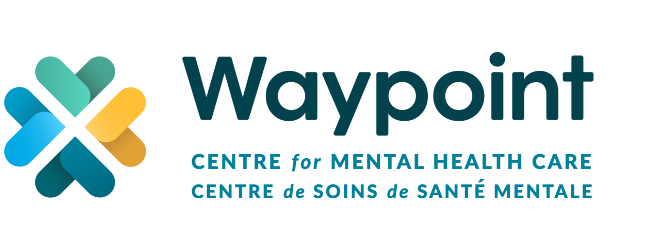Provincial Forensic Mental Health is an area of mental health care that occurs when an individual who has a serious mental illness comes in contact with the law. The courts may find an individual Not Criminally Responsible or Unfit to Stand Trial on account of a mental illness. In these circumstances, the Ontario Review Board (ORB) will refer individuals to a mental health care facility, like Waypoint, with an order for assessment and/or treatment. The ORB is responsible to determine the level of security required to keep both the individual and the public safe.
- Age
- Adults
- Intended For
- Provincial Forensic Mental Health, males who have a mental illness
- Care Providers
- Psychiatry, Medicine, Nursing, Psychology, Social Work, and Recreation.
Our 40-bed Forensic Assessment Program provides comprehensive, multidisciplinary assessments for each patient admitted from the courts, provincial and federal correctional facilities, and provincial regional psychiatric hospitals.
This program provides interdisciplinary assessments, care, management and identification of patients with a serious mental disorder and/or those who pose a significant risk to their self or others.
The interdisciplinary assessments examine issues related to fitness to stand trial, criminal responsibility, and potential for future dangerousness, risk, diagnostic clarification, and future treatment potential.
The team consists of psychiatry, medicine, nursing, psychology, social work, and recreation.
Special information for patients, families and visitors
The focus of the Forensic Assessment Program is on short-term hospitalizations with a specific purpose. An assessment will be completed based on your needs, and an individualized care plan is provided. We encourage you to participate in the process so that we can be as thorough as possible. Your participation includes meeting with members of the team as required. You are also encouraged to take advantage of our many activities including the indoor pool, the recreation centre, and the large yards for physical activities.
The Beckwith Program (A & B) provides care in a high-secure environment to clients predominantly diagnosed with
schizophrenia
a serious mental health condition that affects how people think, feel and behave. It may result in a mix of hallucinations, delusions, and disorganized thinking and behavior.
,
bipolar disorder
a mental illness that causes unusual shifts in a person's mood, energy, activity levels, and concentration. These shifts can make it difficult to carry out day-to-day tasks.
, treatment-resistant symptoms and substance abuse challenges. Clients typically require one-on-one treatment. Once clients are more stable, they will move to the Beausoleil program (below), where they will be prepared for eventual discharge to another forensic mental health program.
The clinical team will help patients define their needs through assessment, treatment, life skills training and health promotion. A broad range of therapeutic activities to assist with psychological, educational, social and vocational needs is offered including:
- Medication/symptom management
- Stress management/relaxation training
- Challenges for change/coping with aggression
- Health teaching
- Substance awareness
- Water intoxification interventions
- Self-care training
- Cooking group
- Leisure skills
- Games and entertainment
- Music therapy
- Arts and crafts
- Vocational services
- Educational services
The Beausoleil Program is focused on meeting the long-term care needs of patients with a major mental illness and personality disorder diagnoses.
The program provides a flexible environment that gives patients choice and freedom of movement into designated areas. Care focuses on promoting self-understanding, self-esteem, self-determination, self-confidence, independence and optimum quality of life. The team will also work together to promote the development and maintenance or restoration of skills, values and attitudes critical to relationships and to promote learning and the use of problem solving and planning skills.
Programming opportunities for patients include:
- Medication/symptom management
- Stress management/relaxation training
- Aggression replacement training
- Health teaching
- Substance awareness
- Life and social skills training
- Self-care training
- Cooking group
- Leisure skills
- Games and entertainment
- Music therapy
- Arts and crafts
- Vocational services
- Educational services
The Awenda Program provides high quality programs for males with a serious mental illness or who may be
dually diagnosed
a term used to describe mental health issues by people with a developmental disability (significant limitations in cognitive functioning).
, within a highly structured high-secure environment.
Activities on the Program are aimed at decreasing risk, eliminating suffering and increasing quality of life. The highly structured daily activities provided are designed to teach and promote socially acceptable behaviours while working on rehabilitation and treatment to stabilize a serious mental illness.
Special information for patients, families and visitors:
The focus of the Awenda Program is supportive hospitalization with a specific purpose of managing symptoms, mitigating risk, improving quality of life and stabilization of the symptoms of serious mental illness. Assessments, including Quality Care Reviews, will be completed and an individualized care plan will be created and reviewed monthly. We encourage you and your Substitute Decision Maker (SDM) to participate in Case Conferences so that we can be as thorough as possible and you are both informed. You will be supported in defining and voicing your recovery needs. You will receive information on Metabolic Syndrome. We will strive to promote hope, growth, healing, empowerment and support all your needs.
Visiting a Patient
Visitors are asked to contact the program/social worker prior to visiting. On some occasions, patients may refuse to meet with visitors, even though they may have travelled a considerable distance. When this occurs, we respect the decision of the patient and we will provide support where appropriate. Waypoint may also restrict visiting hours for clinical or security reasons.
For safety reasons, common areas of the program are monitored by video recording. No cameras or recording devices are allowed in the program.


